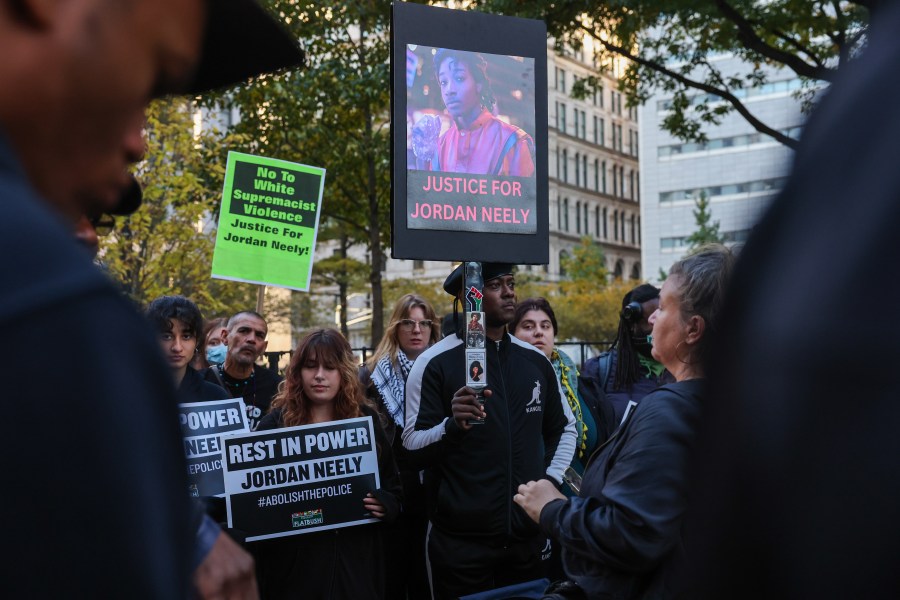(NewsNation) — The jury in Daniel Penny’s high-profile trial has returned and has found the former Marine not guilty in the death of Jordan Neely.
The verdict comes three days after Judge Maxwell Wiley dismissed the manslaughter charge against Penny, who is accused of killing Neely. The judge’s ruling on Friday left the jury to consider a lesser charge of criminally negligent homicide against Penny.
The verdict drew mixed reactions inside the courtroom, including applause. Neely’s father, Andre Zachery, and his attorney were asked to leave the courtroom. In a news conference held outside of the courthouse minutes after the verdict was read, Neely’s family’s attorney, Donte Mills, said the jury had let the family down.
“We’re devastated,” Mills said in a news conference. “Upset, angry, hurt. Over and over again, we keep coming to this system asking the system to let us know that our lives have value.”
He added: “The family is hurt.”
In a statement released by his office, Manhattan District Attorney Alvin Bragg said that the jury had spoken and that he deeply respects the jury proces and the jury’s verdict.
He said that during the trial, prosecutors and their family members were “beseiged with hate and threat.”
“Simply put, this is unacceptable, and everyone, no matter your opinion on this case, should condemn it,” Bragg said in the statement.
Jordan Neely’s family responds to the verdict
Mills said that the family plans to move ahead with a civil lawsuit against Penny. However, in the meantime, he said the family’s call to action was for people to take care of each other because the judicial system could not be relied on to do so.
“If you’re angry, if you’re hurt, go help one person,” Mills said. “That’s how we beat the system. That’s how we turn this around.”
Zachery said in the news conference that he misses his son. He also said that the judicial system is “rigged.”
“My son didn’t have to go through this,” Zachery said. “I didn’t have to go through this either. It hurts. It really, really hurts.”
Gwen Carr, whose son Eric Garner died in 2014 after he was placed in a chokehold by a New York City police officer, said that her son did not receive justice. She said that she pushed for the Anti-Chokehold Act to be passed, but said it should not only apply to police officers, but to civilians.
She said that Monday’s verdict was another example of the American judicial system failing.
“No one deserves to be choked to death,” Carr said at the news conference following the verdict.
What led to Daniel Penny’s not guilty verdict
Wiley gave the jurors the Allen charge earlier on Friday, which are instructions reminding the jurors of how much time and money has gone into the case and how imperative it is that they reach a decision.
This comes after jurors told Wiley they were unable to come to a unanimous decision on the manslaughter charge against Penny, who also faces one for criminally negligent homicide. Penny has pleaded not guilty.
Penny placed Neely in a chokehold for nearly six minutes after the man threatened to kill other passengers on the subway.
The jury, made up of five men and seven women, deliberated after closing arguments began last week. Before the judge dismissed the manslaughter charge, the jury indicated that it could not decide on the manslaughter charge after it struggled with both Penny’s justification for placing Neely in the chokehold and whether the chokehold actually caused Neely’s death.
The jury can find Penny guilty of criminally negligent homicide if it decides Penny acted recklessly or was careless. The lesser charge carries a maximum sentence of four years.
Defense attorneys representing Penny petitioned a judge to have the charges against their client dismissed after Thanksgiving, but the judge ruled that the case would move to closing arguments.
The defense rested on November 29 after electing not to have Penny testify in his own defense.
Deliberations began after the seven-week trial that included 40 witnesses. Jury members also watched hours of video during the trial and listened to recordings of 911 calls that were placed following the incident.
During their deliberations, the jury sent a series of notes to the judge, requesting key pieces of evidence, including cellphone video footage of Penny keeping the chokehold on Neely. The jury also requested that judge read definitions of “recklessness” and “negligence,” which spoke to the issue of Penny’s justification for his actions.
Jordan Neely’s cause of death is disputed
Central to the case was whether the hold that Penny put on Neely led to the man’s death.
The medical examiner, key to the prosecution, said the reason for Neely’s death was the chokehold, but the defense’s experts said this was not the case. He said it was a combination of four factors: restraint and struggle, sickle cell crisis, a synthetic drug in his system called K-2 and schizophrenia.

Penny told officers in an interview room that Neely told passengers on the subway, “I’m gonna kill everybody. I’m gonna go to prison forever. I don’t care. I’m gonna do this.”
The defense’s clinical pathologist, Dr. Satish Chundru, testified that Neely’s injuries suffered in the 2023 incident, along with video shot by passengers, did not indicate that Neely died from the chokehold applied by Penny.
Chundru, citing medical records, testified that the location and extent of the bruising Neely suffered, along with other factors, led him to conclude that the chokehold was not fatal. In addition to the bruising on Neely’s neck, Chundru testified that there was a small amount of petechiae — small red spots caused by subsurface bleeding — on his eyelids.
Chundru concluded that Neely died from “the combined effects” of synthetic marijuana, schizophrenia, his struggle and restraint and a blood condition that can lead to fatal complications during exertion.
Prosecutors maintained that Penny’s actions are directly connected to Neely’s death.
“I’m sure that you had absolutely no question in your mind about what caused Jordan Neely’s death. It’s too obvious,” Yoran said during her closing argument.
“This is a clear case of death by chokehold.”
Daniel Penny encounters Jordan Neely
Jurors learned during the trial that Neely was begging for money May 1, 2023, but that he began to shout to passengers that he was willing to die or go to jail.

Testimony included that Neely, who sometimes entertained passengers as an Elvis impersonator aboard the subway, began acting erratically and began making threats to passengers, witnesses said. Penny has said Neely lurched toward a woman with a small child and said, “I will kill.”
Mills said after Penny’s acquittal that the first thing Neely did when he got on the train was that he asked for food.
“He was killed,” Mills said. “And the person who killed him was not held responsible. We cannot allow this to keep happening.”
Penny put his arm around Neely’s neck, took him to the floor, and held Neely there, with Penny’s legs around him, for close to six minutes, bystander videos show. Neely had stopped moving at roughly the last minute, witnesses said.
Penny’s defense attorneys asked jury members to put themselves in the shoes of those aboard the train, while prosecutors countered that Penny acted too aggressively and was forceful and reckless in responding to Penny. Defense attorney Steven Raiser told jurors during his closing argument that Neely was filled with rage when he entered the train and was not afraid of any consequences.
However, prosecutors argued that despite Neely’s actions, Penny went too far.
“You obviously cannot kill someone because they are crazy and ranting and looking menacing, no matter what it is that they are saying,” Manhattan Assistant District Attorney Dafna Yoran told jurors during her closing argument, according to The Associated Press.
Raiser told jurors this week that his client could not release Neely from the hold without putting others in danger. He also said that Penny never applied enough pressure to Neely to cause his death.
Prosecutors disagreed, citing Penny’s military experience.
“He was trained in this,” Yoran said during her closing argument, referring to the chokehold, according to The New York Times, “and yet he continued with the foreseeable and tragic results.”
The Associated Press contributed reporting to this article.



